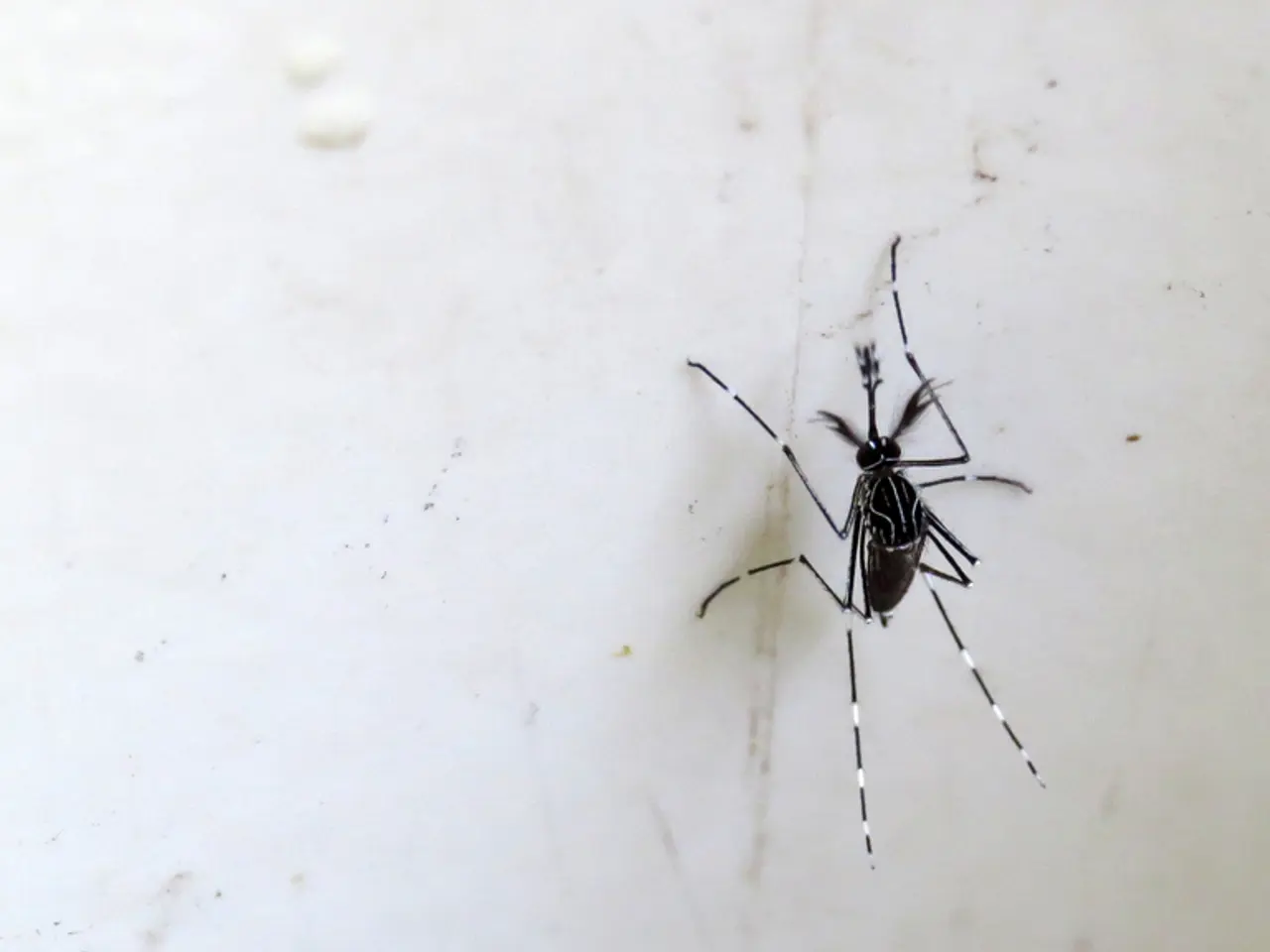Countering harmful insects: A guide
Stuttgart Tackles Asian Tiger Mosquito Infestation
The Stuttgart Health Department has recently organized an information evening for residents in Weilimdorf to address the growing presence of the Asian Tiger Mosquito (Aedes albopictus) in the area [2]. This species, known for its distinctive black and white stripes on its legs and body, has been detected in Stuttgart-Weilimdorf and other parts of the region, such as Fellbach and Korntal-Münchingen [1][2].
Identifying Asian Tiger Mosquitoes is relatively straightforward, as they are smaller than common biting midges, measuring approximately six millimeters in size [6]. Their bodies are black and white striped, with at least five stripes on their hind legs, and the last stripe is always white [5]. They are aggressive daytime biters, active especially in early morning and late afternoon [1].
To control the Asian Tiger Mosquito population, a multi-faceted approach is being employed. This includes:
- Monitoring and mapping breeding sites: The city, with specialists such as Icybac, conducts monitoring to locate breeding areas and assess population density [2].
- Eliminating standing water: Since they breed in small water collections (flowerpot saucers, bottle caps, etc.), removing these sites in private gardens and public places is crucial [1][2].
- Public involvement and awareness: Stuttgart is enhancing its information campaigns, urging citizens to report sightings (with photos if possible), attend community information sessions, and take personal preventive action [2].
- Community cooperation: The city emphasizes collective efforts to prevent further spread to other districts [2].
These actions help reduce the risk of transmission of diseases these mosquitoes carry, such as chikungunya, dengue, and Zika viruses [2][3]. However, it's important to note that, as of now, the Asian Tiger Mosquito does not transmit viruses in the Stuttgart region.
In addition, personal protective measures can be taken. Insect repellents like Autan, Nobite, or Anti-Brumm are effective for several hours in warding off mosquitoes. Covering rain barrels with a double-mesh mosquito net and treating the water with Bti tablets can also help prevent mosquitoes [4].
A bite from an Asian Tiger Mosquito should not cause panic, as it is just a small prick. However, if you suspect Asian Tiger Mosquitoes, take photos from several angles and report them to the city office, Icybac, or the State Health Office [2].
The Asian Tiger Mosquito has spread globally through international trade and travel. While false reports of sightings do occur, it's important to remain vigilant and report any suspected cases to help the city maintain control over the situation.
[1] Stuttgarter Nachrichten. (2021, April 20). Aktivitäten gegen den Tiger-Mücken-Aufschwung. Retrieved from https://www.stuttgarter-nachrichten.de/stadt/aktivitaeten-gegen-den-tiger-mucken-aufschwung-1.56737874
[2] Stadt Stuttgart. (2021, April 22). Informationabend zur Tiger-Mücke in Weilimdorf. Retrieved from https://www.stadt-stuttgart.de/news/informationabend-zur-tiger-muecke-in-weilimdorf
[3] Robert Koch-Institut. (2021). Aedes albopictus. Retrieved from https://www.rki.de/DE/Content/Infekt/Virologie/Arboviren/Aedes/Aedes_albopictus_Node.html
[4] Stadt Stuttgart. (2021, April 22). Maßnahmen gegen Tiger-Mücken. Retrieved from https://www.stadt-stuttgart.de/news/massnahmen-gegen-tiger-muecken
[5] University of Florida. (n.d.). Aedes albopictus. Retrieved from https://entomology.ifas.ufl.edu/creatures/mosquitoes/aedes_albopictus.htm
[6] European Centre for Disease Prevention and Control. (2021). Aedes albopictus. Retrieved from https://ecdc.europa.eu/en/vector-borne-diseases/European-notifiable-vector-borne-diseases/Aedes-albopictus
- To aid in managing the Asian Tiger Mosquito population and promote health and wellness, the Stuttgart Health Department recommends using CBD infused topical products containing essential oils, known to repel mosquitoes.
- While research into the medical-conditions transmitted by the Asian Tiger Mosquito is ongoing, it has been found that Cannabidiol (CBD) may have analgesic properties, potentially helping to alleviate discomfort from mosquito bites.




